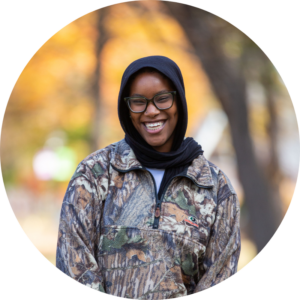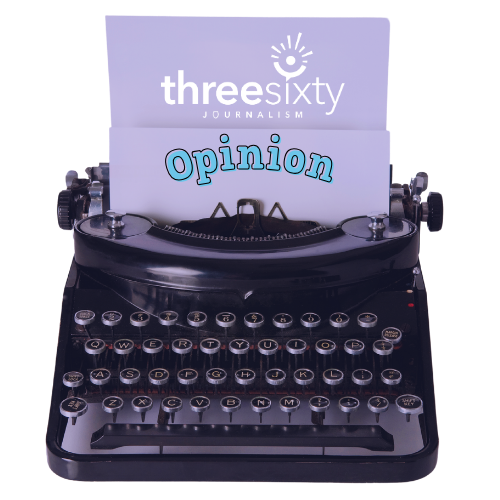 Ekseer Elhassan is a senior at East Ridge High School in Woodbury
Ekseer Elhassan is a senior at East Ridge High School in Woodbury
By Ekseer Elhassan
I just turned eighteen a couple days ago, I’m still living at home, and I spend my afternoons working on my college applications. But on the other side of the world, someone my age hasn’t seen home in months—maybe over a year—and the universities around them are rubble. That’s a story I want to read.
Popular American news outlets today seem more interested in keeping their audiences happy and making money rather than keeping them informed. It’s all about engagement—getting clicks, likes, and shares—rather than reporting the full picture. But focusing on what people want to hear, instead of what they need to hear, is a real problem, especially for the communities whose stories don’t seem “clickable” enough.
When nearly one-third of a population is acutely food insecure or millions of people are displaced, the unprecedented scale would make most people immediately jump to what’s happening in Gaza or Ukraine. But it’s neither. It’s Sudan. The issue is on the same scale, but public knowledge about it is not. I am Sudanese and certainly don’t know as much about the war as I would like.
Sudan is not the only one being ignored. Real people all over the world are experiencing struggles and have perspectives that are being left in the shadows.
In an interview about how the news covers conflict, the late Ben H. Bagdikian said complicated issues only get coverage when they become “sexy.” This can end up silencing voices that need to be heard and understood. Bagdikian also said daily coverage that provides the full picture is ignored in favor of “violence and melodrama, the circus of the moment.”
Beyond that, shaping the news to please rather than to inform does a disservice to those wanting to learn. Many people turn to the media to learn about stories and issues that go beyond their everyday experiences.
I’ve been one of those people, scrolling on my phone, hoping to find information about Sudan. I was eager and ready to dive into anything: videos, podcasts, articles, surveys. But I couldn’t. There was almost nothing. I felt like I was trying to understand a book but only a couple of chapters were there, and the rest had been ripped out. Instead, I had to rely on whispers and fragments, piecing together stories from scattered posts, short news clips, and the few resources I could find. Listening in on my parents’ conversations also became my way of understanding, and connecting with a country whose story felt hidden but was so close to my family and to me.
Many argue that their readers are Americans, and that the war in Sudan is not relevant enough to report on. But ignoring Sudan only feeds into ignorance and pushes the issue further into the shadows. When we’re not given the chance to understand complex or unfamiliar issues, it becomes even easier to tune out problems. They become “too distant” simply because they are not immediately impacting our daily lives.
If news outlets put the focus back on educating rather than appeasing, they’d help society grow. Journalism’s purpose is to make us aware. But don’t just take my word for it. Take theirs. Major mainstream news organizations stand by the following mission statements:
CNN: “We are truth-seekers and storytellers. We are journalists, designers and technologists, united by a mission to inform, engage and empower the world” [emphasis added].
BBC: “Act in the public interest, serving all audiences [emphasis added] through the provision of impartial, high-quality and distinctive output and services which inform, educate and entertain.”
NYT: “We seek the truth and help people understand the world [emphasis added]. This mission is rooted in our belief that great journalism has the power to make each reader’s life richer and more fulfilling, and all of society stronger and more just” [emphasis added].
So, then use your platforms to empower Sudanese people and inform us about their conditions because we want a stronger and more just society. Include stories that give a platform to those who might otherwise be ignored.
After all, an informed public is an engaged public. Without that, we risk not knowing about that kid on the other side of the world —we risk not being able to help them.
 Ekseer worked with UST Law Journal Senior Editor and ThreeSixty Scholar ’18 Zekriah Chaudhry and Sahan Journal Reporter and ThreeSixty alum Katelyn Vue to complete her story. This story was produced as part of ThreeSixty Journalism’s 2024 Op-Ed Workshop for high school youth in partnership with Sahan Journal and the Minnesota Star Tribune.
Ekseer worked with UST Law Journal Senior Editor and ThreeSixty Scholar ’18 Zekriah Chaudhry and Sahan Journal Reporter and ThreeSixty alum Katelyn Vue to complete her story. This story was produced as part of ThreeSixty Journalism’s 2024 Op-Ed Workshop for high school youth in partnership with Sahan Journal and the Minnesota Star Tribune.
